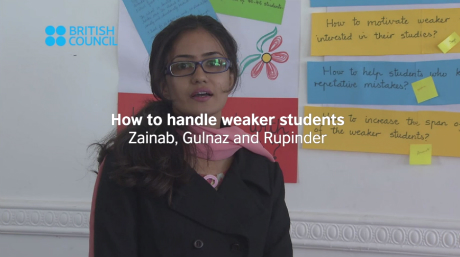
In this video, Zainab Rao and Gulnaz Mondegarian from Pakistan and Rupinder Dhaliwal from India give practical suggestions on how to handle weaker students.
As Zainab points out, students who have not achieved are often still promoted to the next grade and cannot keep up with the others. This poses a challenge to teachers as they attempt to balance the learning needs of students with varying levels and abilities. In order to motivate all learners, the group suggests task differentiation.
This way, teachers can take into account learner differences, ensure all students achieve and raise confidence levels. This approach can also be applied to assessment. As Gulnaz explains, teachers can design papers which contain questions for below-average, average and above-average students. A lack of concentration is another common complaint, but, as Rupinder points out, it is up to teachers to plan lessons carefully and avoid monotony by including short, engaging activities which appeal to a range of learning styles and needs.
As the group suggests, an inclusive and differentiated approach together with careful lesson planning can give weaker students not only a sense of achievement but maybe a chance to catch up.
Reflection and discussion
One of the purposes of these resources is to help you with your own teacher development in related contexts. The questions in task 1 and task 2 are designed for you to think about and discuss with colleagues, either informally or as part of your formal professional development.
If this video is not available for viewing in your location, please click here
Task 1 :
From my point of view, task differentiation is extremely effective and useful in helping learners achieve in writing. Infact, this can build learners' confidence, maintain learners' concentration as well as increase their engagement.
Task 2:
Students may not have fault when not paying attention in classroom. There are many reasons for that:
- learners' lack of background knowlegde
- learners are not motivated
- lesson is not interesting
-weaker students are dominated by better ones
-teacher does not plan the lesson appropriately
-learners have different learing goal and style
I have realised that I have not considered these factors properly when planning my lessons.
In my opinion, teachers have to consider these factors carefully when planning lessons and make every efforts to invest in the lessons to make sure that our lessons engaging.